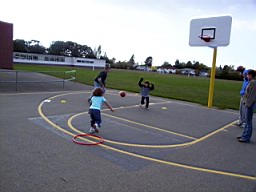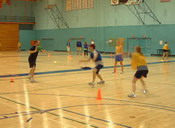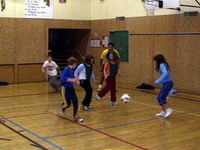| |
THEORY |
|
|
|
|
|


|
Drawing on situated learning and constructivism the teaching approaches that have resonated with the TGfU have
focused on guided questioning and problem solving approaches. These
approaches are supported by constructivist learning theories. The basic
premise to good games teaching is that learners need to read tactically
the situation in a game and then select and execute the appropriate skill
based on their reading. Essentially skill learning is built on an
understanding of when and how a technique will be used
based on an awareness of the need for the technique after playing a game designed to use the
technique as skill. Therefore, the WHY you need a skill is taught before HOW to do
the technique of a skill. By playing a modified game "children
should begin to see the need for, and relevance
of, particular techniques as they are required in the game
situation." (Bunker and Thorpe, 1986, p. 7).
|


|
|
|
|
|
|
|
| |
|
CONTENT |
STUDENT
|
TEACHER
|
MILIEU |
| |
Learning and teaching
theories |
Transfer of learning -
Schema theory |
Whole-Part-Whole
learning
Procedural
Knowledge
Declarative
Knowledge
Conditional
Knowledge
|
Social Constructivism
Guided Questioning
|
Socially Situated Learning
Problem Solving
|
|
Practical Example |
Classification of Games
Content Analysis for beach volleyball |
Article
Student emphasis over
content emphasis
|
Video
3 minute summary of a Lesson
Article
Can we play the game
|
Article
A tactical framework for teaching games
|
|
Benefit |
Tactical concepts and biomechanical
principles of skill development transfer between games within same games
category |
Students of all skill abilities are more motivated to
play. Using the game as a reference to assess game performance
rather than skill performance means that all students can play effectively
if the game is modified appropriately
|
Teaching in a tactic-to-skill focus means that the teacher
learns to channel the students' natural desire to play a game. By
getting students to consider tactical questions the cognitive
dimension of game play is emphasized and leads to more meaningful skill
practice.
|
The teaching milieu in a tactic-to-skill focus becomes very
active. Students learn to take responsibility for (1) the play of the
game, (2) the challenge in the task, and (3) learning to work with each other to
share the joy of a well played game.
|
|
Challenge |
Need to understand all games conceptually
rather than a few games as a skilled player. Teaching content
conceptually and progressively across games within game categories rather than teaching
one discrete sport. |
Students expect to play in games at the same level even
though their genetic and experiential abilities are very different.
How to get students to focus on playing effectively rather than winning as
a measure of success?
|
Managing the class of children often causes teachers to focus
on control and telling students what to do. Unless a teacher crates a
game that all students can play, where they are challenged, management can
become an issue. A teacher needs to build students ability to adapt
games and play with each other effectively.
|
Creating the most appropriate learning environment for each
student means that the teacher has to teach the students to take
responsibility for their own and others learning situation. The teacher has
to learn when to intervene and when to allow the students to learn to read
the situation and adapt as needed. |


